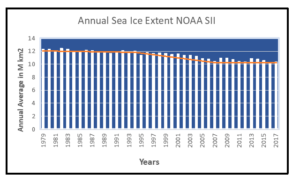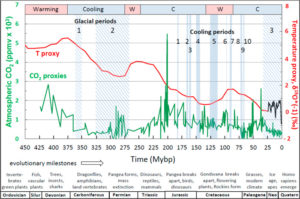by Brown University, September 24, 2018 in ScienceDaily/EPSL
A new study shows evidence that ancient Mars probably had an ample supply of chemical energy for microbes to thrive underground.
“We showed, based on basic physics and chemistry calculations, that the ancient Martian subsurface likely had enough dissolved hydrogen to power a global subsurface biosphere,” said Jesse Tarnas, a graduate student at Brown University and lead author of a study published in Earth and Planetary Science Letters. “Conditions in this habitable zone would have been similar to places on Earth where underground life exists.”
…

New research shows that ancient Mars likely had ample chemical energy to support the kinds of underground microbial colonies that exist on Earth.
Credit: NASA / JPL
by P. Gosselin, September 23, 2018 in NoTricksZone
Last year, August, 2017, a massive rockslide occurred on the north flank of the Piz Cengalo (3369 m) in the Swiss Alps, above the village of Bondo, located near the border to Italy.
…
No data suggesting warming is behind rock slides
In total some 4 million tonnes of rock and mud came tumbling down. The dramatic incident highlighted the hazards posed by rock slides for villages located near the picturesque mountains of the European Alps.
Though rockslides are not unusual, there has been growing scrutiny behind their causes lately. Unsurprisingly climate alarmists are opportunistically pointing the finger at climate warming.
by Donna Laframboise, September25, 2018 in BigPictureNews
SPOTLIGHT: Bureaucracies put their trust in other bureaucracies.
BIG PICTURE: A few weeks back, Joanne Nova perfectly captured the position of the British Broadcasting Corporation (BBC) regarding the scandalous UN entity known as the Intergovernmental Panel on Climate Change (IPCC).
A recent internal document gives BBC journalists advice about how to report on climate matters. In Nova’s words, it declares that the “IPCC is God, can not be wrong.”
The document’s exact words:
…
by Michael Bastasch, September 21, 2018 in TheDailyCaller
Environmental officials warned 30 years ago the Maldives could be completely covered by water due to global warming-induced sea level rise.
That didn’t happen. The Indian Ocean did not swallow the Maldives island chain as predicted by government officials in the 1980s.
In September 1988, the Agence France-Presse (AFP) reported a “gradual rise in average sea level is threatening to completely cover this Indian Ocean nation of 1196 small islands within the next 30 years,” based on predictions made by government officials.
Then-Environmental Affairs Director Hussein Shihab told AFP “an estimated rise of 20 to 30 centimetres in the next 20 to 40 years could be ‘catastrophic’ for most of the islands, which were no more than a metre above sea level.”
…
by Ron Clutz, September 22, 2018 in ScienceMatters
People are overthinking and over-analyzing Arctic Ice extents, and getting wrapped around the axle (or should I say axis). So let’s keep it simple and we can all readily understand what is happening up North.
I will use the ever popular NOAA dataset derived from satellite passive microwave sensors. It sometimes understates the ice extents, but everyone refers to it and it is complete from 1979 to 2017. Here’s what NOAA reports (in M km2):
…

by David Middleton, September 24, 2018 in WUWT
Alternate Title: Yes, We Have No Anthropocene, We Have No Anthropocene Today! (Sung to the tune of Yes, We Have No Bananas)
…

Figure 4 from Finney & Edwards. “Workflow for approval and ratification of a Global Standard Stratotype Section and Point (GSSP) proposal. Extensive discussion and evaluation occurs at the level of the working group, subcommission, and International Commission on Stratigraphy (ICS) Bureau. If approved at these successive levels, a proposal is forwarded to the International Union of Geological Sciences (IUGS) for ratification. This process is also followed for other ICS decisions on standardization, such as approval of names of formal units, of revisions to the units, and to revision or replacement of GSSPs.”
by Davis W.J., 2017 in Climate/CO2Science
…
One final gem from Davis’ work is a pronouncement that follows a discussion on the lack of correlation between CO2 and temperature across the historical record, where he aptly reminds us that “correlation does not imply causality, but the absence of correlation proves conclusively the absence of causality.” Consequently, there should be no more doubt regarding the ineffectiveness of atmospheric CO2 to control or drive climate change. It is simply nothing more than a bit player, whose influence has been continually overestimated by climate alarmists. The big question now is whether or not 500 million years of these data will convince them otherwise!

from Davis 2017
Egalement: Le changement climatique : la règle en géologie
La géologie, une science plus que passionnante … et diverse




